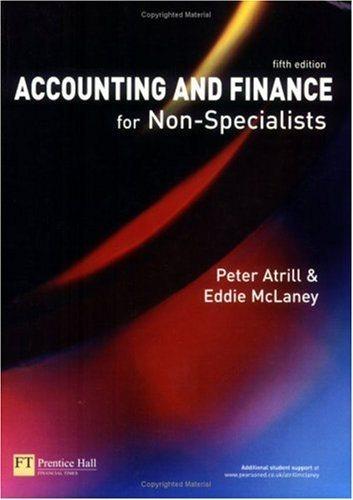Boswell Enterprises Ltd is reviewing its trade credit policy. The business, which sells all of its goods
Question:
Boswell Enterprises Ltd is reviewing its trade credit policy. The business, which sells all of its goods on credit, has estimated that sales revenue for the forthcoming year will be
£3 million under the existing policy. Credit customers representing 30 per cent of trade receivables are expected to pay one month after being invoiced and 70 per cent are expected to pay two months after being invoiced. These estimates are in line with previous years’ figures.
At present, no cash discounts are offered to customers. However, to encourage prompt payment, the business is considering giving a 21
/2 per cent cash discount to credit customers who pay in one month or less. Given this incentive, the business expects that credit customers accounting for 60 per cent of trade receivables to pay one month after being invoiced and those accounting for 40 per cent of trade receivables to pay two months after being invoiced. The business believes that the introduction of a cash discount policy will prove attractive to some customers and will lead to a 5 per cent increase in total sales revenue.
Irrespective of the trade credit policy adopted, the gross profit margin of the business will be 20 per cent for the forthcoming year and three months’ inventories will be held.
Fixed monthly expenses of £15,000 and variable expenses (excluding discounts), equivalent to 10 per cent of sales revenue, will be incurred and will be paid one month in arrears. Trade payables will be paid in arrears and will be equal to two months’ cost of sales. The business will hold a fixed cash balance of £140,000 throughout the year,
whichever trade credit policy is adopted. No dividends will be proposed or paid during the year. Ignore taxation.
Required:
(a) Calculate the investment in working capital at the end of the forthcoming year under:
(i) the existing policy;
(ii) the proposed policy.
(b) Calculate the expected net profit for the forthcoming year under:
(i) the existing policy;
(ii) the proposed policy.
(c) Advise the business as to whether it should implement the proposed policy.
(Hint: The investment in working capital will be made up of inventories, receivables and cash, less trade payables and any unpaid expenses at the year end.)
Step by Step Answer:

Accounting And Finance For Non Specialists
ISBN: 9780273702443
5th Edition
Authors: Dr Peter Atrill, Eddie Mclaney





